Text
“Quizás tanto tiempo me he subestimado que me asombro cuando alguien me trata bien, siento que quizá la persona se esfuerza mucho en hacerlo, pero no… a veces nos dañamos tanto y el origen viene de uno.”
�� Firthunands
521 notes
·
View notes
Text
"내가 한국말로 음식주문할 때" - 2020.01.26 [pt. 1]
안녕하세요 여러분! 요즘 한국말을 많이 공부하고 있는데 부끄러워서 연습을 못해요. 연습할 때 …. 자… 그냥 이해하기 위해서 만화를 (첫 파트) 보야 돼요.
읽어줘서 고마워요 ~~




Hello Everyone! I have recently been studying Korean a lot … but I’m really shy when it comes to practicing. Because .. well when I do practice…this happens. Part two will be out hopefully next week! Stay tuned ~
Click the read more button to get the vocab if you need help reading!
Happy Learning :)
~ SK101
P.S. can anyone else relate to my struggle….??? Also, I’m still trying to find my comic style - and I think I’m getting somewhere!
Keep reading
103 notes
·
View notes
Photo

these are some language tips that i follow(ed) when i learn(ed) languages. currently, i am using these tips for two languages, so i hope they help all of you as well!
1. immerse yourself. know the culture really well! don’t let others calling you a “weeb” or “otaku” get in the way. i know it may be discouraging, but you’ve got to understand their culture to really understand what you’re learning. there are going to be different onomatopoeia words, conversational slang, words of endearment, etc. you’re not going to understand it through the textbook. rather, you’ll only understand it through hearing it and understanding it. witness the culture through
-movies/dramas/commercials in that language. -books in that language. -music. -conversations. (huh? refer to step 5.) -travel! -the alphabet
if you know how to read the language, you will be able to pick up on pronunciations. knowing how to speak properly is vital to your language learning, as you can only get better this way. listen to conversations and try to imitate the way they speak, the inflections they add, etc. if they roll their “r” and you cannot, practice and substitute. lots of people will add a soft “d” sound to their words where a rolled “r” is.
reading allows you to learn much more vocabulary (if you look it up). this is great for conversation!
2. speak. huh? how do you do that if no one speaks it around you? speak with yourself, literally. if you’re doing something, going somewhere, or thinking something, try translating your actions in that language. narrate everything you’re going in your language! this way, if you stumble on a word, you can look it up and use it in your sentence. you learn more vocabulary this way and also get familiar with the sentence structure and the grammar. if you speak to a pet, speak it in your learning language. or just have a conversation with yourself. stand in front of the mirror and pretend that you’re talking to someone. answer any questions you ask the mirror so you get comfortable with hearing the answers.
3. practice. regular practice is how you get better. read a word, define words, write them, and say them out loud. this is the best way to remember what you’re learning. associating sounds with pictures (alphabet) and vice versa is the best way to remember, and practice is the only way you can do this. if you’re sitting on the bus or have idle time, think about what you learned and recap everything you know so far. reviewing your already learned knowledge is also a way of practice. practice with others, if you have co-learners or people who already know that certain language.
4. listen. listen to the language. this is not in movies or dramas, but in regular youtube videos of interviews. look for “interviews in ____” and listen to the way they talk. search for conversational videos and listen. you can learn the formal and informal ways of speech and any slang.
-download audio.
i have mp3 of lessons that I listen to. i literally learn on the go. if you travel, if you’re sitting with headphones in, start listening to the lesson. most lessons will repeat the word/phrase/concept more than once, so you usually remember the topic quickly. this is just like being in a class! take notes if you can so you can go back to them.
5. read conversations. what the hell does this mean!? type in “conversation transcripts in ____” and you will often get conversations with the sentences underneath that you can read along to. FIRST, listen to it without reading it and try to understand as much as you can. THEN, read the text, but keep the audio off. anything you might have missed from the audio will stick out. LASTLY, listen and read. this will match sounds with the words, which will make you remember so much easier! reading conversations will get you better at understanding and speaking!
6. share your knowledge. if you can teach it, you definitely know it! share what you know with people who are curious. explain the basics and translate everything, making sure you are 100% correct. or you can resort to explaining to yourself, which is just as good! explain what you have learned and go through any exceptions!
7. keep track. keeping track of what you have learned will let REVIEW be easier. you will be much more motivated when you see how much you have progressed. tracking your knowledge will remind you of how much more you have to learn, too. knowing what you know and knowing what you don’t know are really important! you can learn much more faster this way! use notebooks, blogs (like these) or little cards!
-separate what you have learned by topic. (colours, grammar, etc.) -keep track of phrases based on formality so that you can differentiate where to use what. -alphabets that you learn should be a separate category! especially for languages with lots and lots of letters/characters!
that’s about it! i’ve gotten lots of questions on how i’m good at languages. i practice with my family and myself, because I know that makes me much better! happy studying and good luck!
2K notes
·
View notes
Text
language learning made easy
I’ve summarized professor Alexander Arguelles’ video, because I think this is crucial for language learning.
There is no magic trick that will help you become fluent in 1 month, but there are very effective approaches to learning a new language and if you combine them, you will surely become fluent.
If you’re learning a new language, the most important thing you need to consider is ��� what type of language learner are you?
1. If you:
have a more deductive approach, which means that you’re better at listening to and observing the language first and learning through that, rather than starting with plain grammar points from a textbook
have a fair degree of intuition
like to observe a phenomenon
feel somewhat comfortable with ambiguity for a while, until things become clear
are someone who can feel comfortable being corrected when they realize they were wrong, rather than getting confused and frustrated because they went down an initial path that turned out not to be correct (so you actually learn from being corrected and you don’t get confused by it)
then, these manuals are best suited for you: the Assimil Language Series, the Linguaphone Series, the Cortina Methods.
2. If you:
have a desire to have things explained to you beforehand in a nice and clear way
have a logical and analytical mind (which is usually the product of education in general)
have a need for a systematic approach (basically if you’re most comfortable with a book which is going to introduce the grammar according to an agreed set of methods or an organized plan)
then, you should try out some of these manuals: the Hugo Series, the Made Simple Series, the Teach Yourself Series, the Buske Series.
3. PAY ATTENTION TO PATTERNS!!!
the most important part are the patterns of a language
no matter what type of language learner you are, I think it’s really clever to incorporate this method into you learning.
a language is actually made up of patterns which constantly repeat themselves and that is THE KEY TO FLUENCY
repeating the patterns over and over again, until they become natural, until you no longer have to conjugate the verbs in your head before speaking
when you become really good with patterns, your sentences will come out naturally, and patterns are what will get you to fluency
I’ve provided the links, where you will find a review of the books, so that you can have an idea of what they look like. You can find most of these on amazon.
There is also an amazing blog on here, which provides free books, and I think that you can find half of these series for free there. @lovelybluepanda
21K notes
·
View notes
Text

Do you know these times when you’re sitting in front of your textbook, trying to learn these boring af vocabs you’ve seen 1000 times but still can’t remember and just wish to do something different (or hoping that the world explodes so you can at least stop)?
Well, there are more ways to learn a language and I think because we just learned how we “should” learn a language at school, we’re limited in creativity. Thanks to school it’s hard to think outside of this “textbook, vocab lists, tests, etc.” stuff but there are ENDLESS things you can do to learn a language. Remember: everything you do in your native language, you can try to do in your target language!
This is for all the people who are tired and exhausted, who are thinking about quitting or don’t have fun with their target language anymore. DON’T YOU DARE TO GIVE UP! YOU’VE COME SO FAR!
_____________________________________________ Examples for different ways of learning a language:
write a diary
summarise an article about a topic you like (cooking, fitness, etc.)
listen to a podcast/radio
listen to music (while reading the lyrics)
try to sing along with music
read out loud while reading a book/magazine/blog/etc.
watch movies/series/videos
record videos in your target language or about how studying is going (progress, problems, etc.)
write a blog (well hello there :))
use apps that make it more fun (duolingo, memrise, lingodeer)
chat with native speakers
actually talk to native speakers ( I know what a crazy idea)
read websites about things you’re interested in
use social media only available in your target language
change the language of your smartphone
change the language of your pc
change the language of your life
play games in your target language (like not necessarily for learning it, I mean just playing a normal game IN your target language)
take online lessons with teachers that make you forget you’re learning
do a challenge! (I love this one so much)
find a learning group
be active in forums (no matter about language learning or a forum in your target language)
find a language exchange partner. (You should, seriously.)
watch lessons on youtube
read a (children-)book (with audio)
talk to yourself
think in your target language (a fun way is to tell a story about your life while it’s happening like “I went down the road with a stranger always behind me, who could it be? What does he want? It got quite… too quite. I tried to keep calm but was it really a coincidence? All in the middle of nowhere?” I know I’m bad at this but I hope you get what I mean, think of it like reading a book.)
learn vocabs with pictures, type in the word you want to know and ONLY look for pictures, try to feel the word. If you google for “strawberry” (in your target language and don’t know what it means) look at the pictures, the colours, how could it smell? Make a sentence with the new word. When was the last time you ate it? How was it?
Write a story/book online or just for yourself.
Make a mindmap
Use a topic jar (a jar where you put in notes with different topics on it, you take one every day and write/talk about it)
use social media to find groups interested in learning a new language or your target language
translate texts and act like you’re a famous translator who’s the only person on earth who can translate your target language (for example if you’re reading articles about historical stuff, act like you’re the only one who can find out what happened back then and the whole world is counting on you!)
try to solve random online tests
listen to a song/audiobook/whatever and write down what you hear
search for words you want to learn and build up (funny!) sentences with them or even whole stories
read comics/mangas/etc.
search for receipts in your target language and pray to god you’re doing it right… if not, well you won’t forget the vocab again. Win-win situation. :p
search for language learning groups near your living place and actually meet them (stay safe and check everything before)
listen to children songs (I still remember the first children song I learned in English lessons… like… 11 years ago in 5th grade) these songs are supposed to stick… *cough* head shoulders knees and toes knees and toes *cough* sorry where was I?
connect with language learners over Skype (useful groups of course like German trying to learn French, Frenchman trying to learn Turkish, Turk trying to learn German)
write a list (you know… like I do right know so I don’t forget English)
describe things you see (more fun with a partner)
teach your target language to others
listen to audio while sleeping
take notes in your target language (I don’t mean for grammar rules or something like that, I mean notes you would take in your native language anyway)
write a letter (so much better than an e-mail)
write an e-mail (who has time for letters)
learn rimes
learn jokes (it’s also useful for social interaction)
talk to your pets (at least if they listen to you, if I start to talk to my cat she starts yelling into my face)
translate songs and learn the vocab of it so you have more fun listening to it later
think about a topic and write down every word you can think of and then translate them into your target language
10K notes
·
View notes
Text
General Language Learning Tips
I’ve tried learning a few languages (Spanish, French, Italian, Japanese, Korean and a bit of Mandarin) by self study and class study. Here’s what I’ve worked out does and doesn’t work for me. Take it with a pinch of salt!
1) Learn grammar, but don’t sweat it too much. There’s a debate about whether to ignore grammar completely and pick it up, or whether to rigourously study it. Do what you want, but in my experience, learning the concept, then constant application is best.
For example: Learn a new structure, make your own example sentences and then get a native speaker to check them. You’ll end up hearing the grammar too, which can be helpful
I tried the “just pick it up method” for Spanish and French, and it kind of worked, but I made a ton of mistakes with grammar and couldn’t work out how to correct them until I actually learned the concept
2) Don’t just use flashcards for vocabulary learning. They are a great tool, but not alone. Application again is really useful. For example, go through a deck on Quizlet and learn the words. Once you’re sure you’ve memorised them, look at the translation in your native language and write example sentences with those words in your target language, and again check them with a native speaker. This method could also pair with your grammar studies. This is just a recommendation, but try and find a way to apply the vocab.
3) For getting native speakers to correct you, there isn’t always a native or advanced speaker at your disposal. Apps like HiNative or a language exchange app like Tandem is good for this.
4) It’s so easy to get discouraged when you watch a TV show and you struggle to understand, or you read a book and don’t understand every other word. With harder sources, be a little lighter on yourself. Put on subtitles in your target language, or look up every word you don’t understand, then re-read the passage, glancing back at your vocab list. Eventually it will get easier as long as you keep doing it
5) Another way to learn vocabulary is to just look up words that you can’t translate as you come across them. This is how I learn the majority of my Italian vocabulary. I read an article or a text, and I annotate words I don’t know with the translation, then read over the text again. I don’t review the words, I just look them up again if I don’t recognise them the next time I see them. This is great for when you feel lazier or not in the mood to memorise. I used this method with Japanese song lyrics too, and it even helped me with Japanese sentence structure
6) Output>Input. Speak and write whenever you can. Speak to yourself, write a diary, write with a language exchange partner, repeat phrases you hear watching TV.
7) ^^ That being said, give yourself as much input as possible. Listening to music is my favourite method for this, but I’ve started watching a series in Spanish and Italian, which I recommend for intermediate learners. Reading books is also good for intermediate learners. Beginners, I recommend music and children’s books, but still check out stuff for intermediate learners if you wish.
8) When you hit a stump with grammar or vocabulary, or you feel like you can’t speak at all, target that for however long you can. Repetition of phrases and methods should help you. Check different sources for different explanations or a different method. If that really doesn’t work, revisit it in a week or so.
That’s all I can offer. Please message me if have any questions or queries, and I’ll happily answer!
501 notes
·
View notes
Text
Mandarin Family Vocabulary

1. 爷爷: Paternal grandfather [yéye]
2. 奶奶: Paternal grandmother [năinai]
3. 老爷: Maternal grandfather [lăoye]
4. 姥姥: Maternal grandmother [lăolao]
5. 姑姑: Aunt (father’s sister) [gūgu]
6. 伯伯: Uncle (father’s older brother) [bóbo]
7. 叔叔: Uncle (father’s younger brother) [shūshu]
8. 父母: Parents [fùmŭ]
9. 爸爸 / 父亲: Father [bàba / fùqin]
10. 妈妈 / 母亲: Mother [māma / mŭqin]
11. 舅舅: Uncle (mother’s brother) [jiùjiu]
12. 姨妈: Aunt (mother’s sister) [yímā]
13. 公共: Father-in-law (husband’s father) [gōnggong]
14. 婆婆: Mother-in-law (husband’s mother) [pópo]
15. 哥哥: Older brother [gēge]
16. 姐姐: Eldest sister [jiĕjie]
17. 女婿: Son-in-law [nǚxu]
18. 女儿: Daughter [nǚ’ér]
19. 儿子: Son [érzi]
20. 儿媳妇儿: Daughter in law [érxífur]
21. 外孙子: Grandson (daughter’s son) [wàisūnzi]
22. 外孙女: Grandson (daughter of daughter) [wàisūnnü]
23. 孙女: Granddaughter (child’s daughter) [sūnnü]
24. 孙子: Grandson (son of son) [sūnzi]
25. 丈人: Father-in-law (wife’s father) [zhàngren]
27. 丈母娘: Mother-in-law (woman’s mother) [zhàngmuniáng]
28. 妹妹: Younger sister [mèimei]
29. 弟弟: Younger brother [dìdi]
30. 爱人: Spouse [àiren]
790 notes
·
View notes
Text
College Note-Taking System
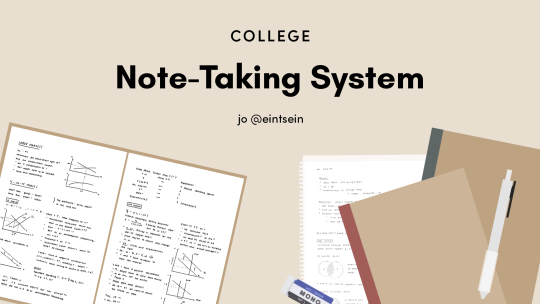
Having cohesive and effective notes is one of the key skills I think one should have, especially in an academic setting. When you’re receiving a ton of information each day, you want to be able to keep track of that and remember what you’ve learned. I’m constantly trying out ways to make my note-taking more effective and tailored to my needs. Here’s what my note-taking system looks like so far.
Quick note: click on the images for better quality!
Class Notes
Taking notes in class is an invaluable way to keep track of the new knowledge you’ve gained. However, depending on the mode in which the lecture material is conveyed, I take my notes differently. Here’s a summary of how I take my notes for each type of lecture, as well as some examples from the classes I’m taking now.
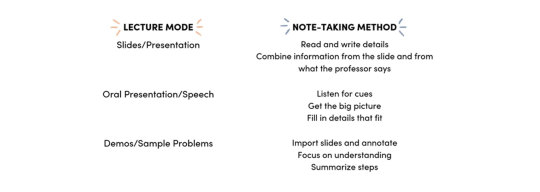
Slides (e.g. Macroeconomics)
Macroeconomics is a class in which you should be able to intuitively understand a lot of concepts but also remember a lot of things. Because of this, I’ve tailored my note-taking method and habits to achieve that goal.
I write my notes by hand because handwriting is more effective in committing things to memory.
As for what I actually do - and this is what I’ve done for other classes in which the professor/lecturer uses slides:
Read/skim over the slide.
Read each bullet point as the professor goes through them.
Copy it down if it’s straightforward or write it down in a structure and diction that I understand better (not necessarily in my own words - sometimes it’s just restructuring, e.g. splitting things up or joining different bullet points together).
Take note of any other important details the professor says about any particular point unless I think it’s intuitive or common sense.
Here’s an example from a Macroeconomics lecture.
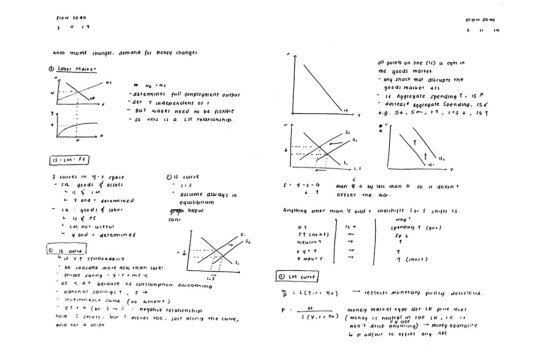
Oral Presentation (e.g. Anthropology)
During classes in which the professor just speaks and doesn’t use much visual material, I listen before I write instead of attempting to write down every single detail mentioned.
Also, I type up my notes instead of handwriting them since the exams are all open-book so I don’t really have to commit things to memory.
Here’s what I do:
Listen for a cue that tells you what this particular part of the lecture will be about (and write it as a heading).
Write down main ideas and their supporting facts/details. If the facts/details come before the main ideas, then I’d usually draw an arrow.
Write down ideas and details from readings in their own section/subsection.
Sometimes, my professor also shows short clips in class, in which case I’d write down the message that I think the clip was meant to convey, as well as things that the professor points out that I didn’t think of on my own.
I’d also look up concepts/ideas/people/events (in real time) that are important to my understanding of the lecture material.
Here’s an example of a Google Docs document from an Anthropology lecture.

Demonstrations and Sample Problems (e.g. Computer Science)
Classes in which the lecture is mainly going through demos and problems are kind of tricky, because you want to know and understand what the professor is doing, but you also don’t want to be writing down every single step that’s being executed. Here’s what I’ve found to be the most effective so far:
If there are any, I import the slides/handout onto OneNote and annotate directly on the slide. If not, I just write down things like definitions, important concepts, and syntax-related things.
I focus on understanding what the professor’s doing with the demo or problem.
I then summarize the steps they took and
Write down comments and points they brought up, e.g. common errors, desirable habits/practices.
Also, these kinds of classes are usually classes in which you’d learn better when you actually do problems yourself, so I definitely learn more when I do assignments and labs than when I’m in class.
Here’s an example from a Web Programming lecture.
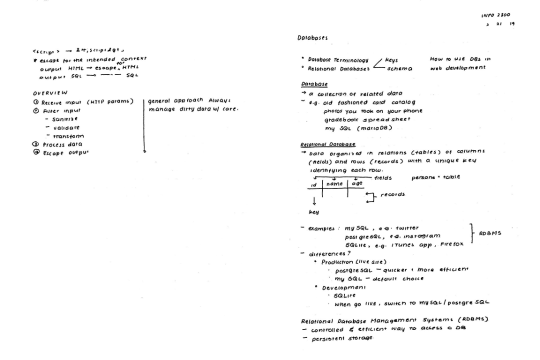
Here’s one from an Object Oriented Programming and Data Structures class. I often draw things to help me visualize the general points.
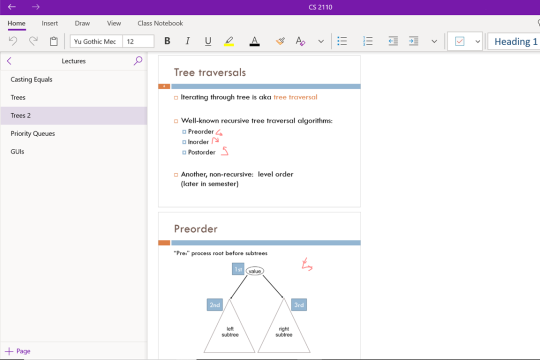
Rewritten Notes
My rewritten notes have definitely changed a lot since high school. Since most of my classes don’t require a lot of memorization, I organize my notes in such a way that they’d be easy to index or find information from. Here are some of the ways I do that:
Establishing a Visual Hierarchy
Having a well-defined hierarchy helps me flow through my notes really well as i read them. It helps me organize information like a mind map without actually making a mind map - I know the big topics and their subtopics and sub-subtopics and details … basically it’s easier to see how these ideas fit together.
But why don’t I just make mind-maps? See, the thing is, a lot of my notes require sequential or linear thinking, e.g. in macroeconomics it might be the sequence of events following a change in the economy, or in computer science it might be a general algorithm for solving a certain type of problem, or it might be proving or deriving a certain equation. These sorts of things just generally don’t work well with mind maps. Instead, establishing a visual hierarchy in my notes helps me organize different ideas while retaining the linear nature of the information.
Here’s what the hierarchy looks like.
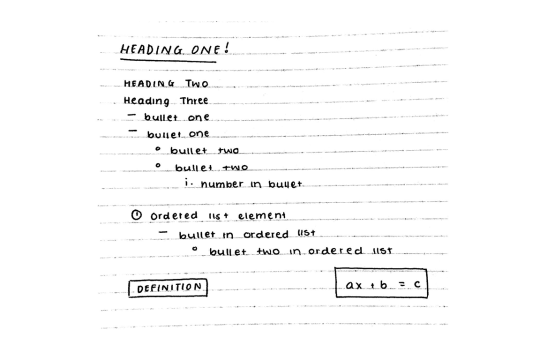
Here is an example from my Web Programming class, which is a purely project-based class, so no prelims or exams. As you can see, I draw rectangles around important terminology so that I can easily find them while I’m working on a project. I also include examples from in-class activities as well as notes on syntax so I have an idea of how to implement certain things. These examples and notes are further grouped by terminology/concept.
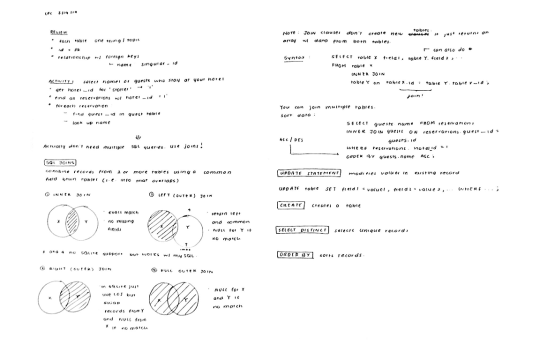
Structuring Them for Easier Flow
My syllabi for my college courses are nowhere near as detailed as the syllabi for my high school courses - those of you who take/have taken Cambridge exams would know. In college, my syllabi are only lists of topics and not what you’re expected to know for each topic. Because of this, I have to find a way to arrange information so that I can achieve the most comprehensive and cohesive understanding of that topic, i.e. so that the flow of my notes is similar to the flow of my thinking.
For example, in my economics notebook, I like to have the details first (e.g. the separate markets: the goods market, the assets market, and the labor market) and then the big picture later (IS-LM-FE). Some people prefer the other way around - seeing the big picture and then going into the details - which I can understand and have done myself for certain topics.
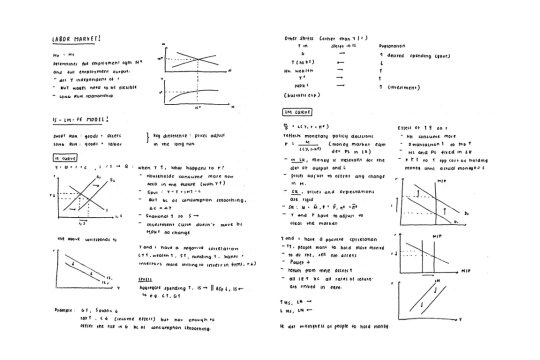
Making Use of Proximity and Spacing
I very much dislike notes without good use of spacing and grouping things together. Keeping related ideas in visual proximity helps your brain (or at least mine) organize this information. It’s also a lot easier to find things and visualize your notes when they’re not just a huge chunk of text.
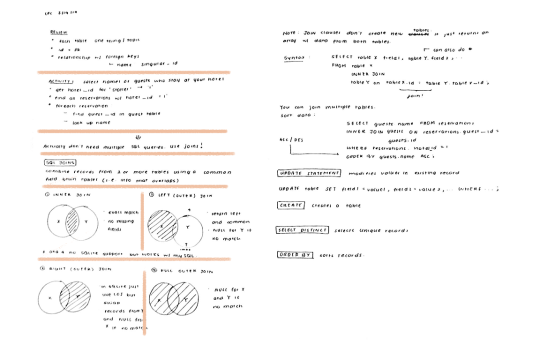
One thing I should probably mention is that I don’t use colored pens anymore because it just takes a lot of time to switch pens and think of a color palette. I also don’t have much use for it. In the past, I used color to help me memorize and group things in different categories, but now, I’ve found that there aren’t a whole lot of categories I need to keep track of, and when I do, I can do so with just one pen but changing the style of the text.
And that’s what my note-taking system currently looks like. It’s working well so far, but I still think there are other things I could try out that might be a better fit.
So yeah, hope this was helpful, and as always, feel free to drop an ask if you have any questions, or even if you have any suggestions or would like to share your note-taking system. Have an awesome week!
10K notes
·
View notes
Photo
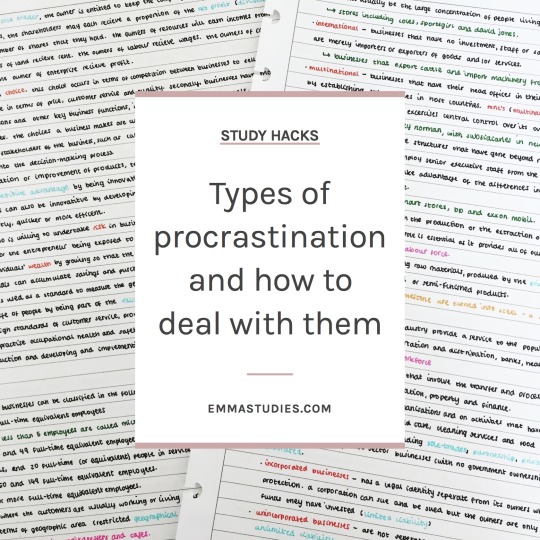
How to deal with procrastination
One of the biggest problems for students is procrastination! It takes different forms for everyone but ultimately it stops us all at some point. Since there are several reasons for procrastinating, I’ve put together the five main types and a few ideas on how to deal with it.
You’ve got poor work/productivity habits. You leave things until the last minute since you “work better under pressure”. You probably think you’ll do something after you’ve finished something else, and then never do. You get distracted whenever you’re trying to study and will sit waiting to feel motivated but it never comes. For this I’d suggest:
create a productivity inspiring workspace - find somewhere that you can set up a study space, whether it is an actual office or just a desk. Organise everything that you will need. I have a selection of pens and my few notebooks on the top so I can easily access them. Remove anything that might cause you to be distracted and doesn’t need to be in your immediate reach. If you’re got space, put up some motivational pictures. This could be my motivational printables, some quotes or your own pictures. Plants are also proven to boost productivity, so might be worth putting a small one nearby!
create an action list rather than to-dos - write down a few manageable tasks that you need to do and be specific on the steps you should take. Writing the actions they require will help you see what you should be doing to complete something, instead of just the overall task. If you’re able to break it down, you can take actionable steps rather than mentally having to think of each point.
focus on 20-30 minute periods - generally, we lose focus after a while so taking regular breaks can help give you chance to relax and refocus. Apps like Forest allow you to set a timer and will give you off your phone at the same time. Obviously, if you’re being productive, don’t suddenly cut that off because it is “time for a break”. Here are some other free alternatives.
remove distractions as best you can - I’m always distracted by social media so I will use Forest on my phone or time-lapse myself so I can’t use my phone. With my MacBook, I have two accounts. One for university and one for everything else. I am not logged into any social media on my uni account so I can’t just check it for a minute then end up wasting 20 minutes :’-)
find an accountability partner - pick someone who you can rely on to check on you regularly and see how your tasks are coming along. You can send them your to-do list and then every few hours you can update them with your progress. You won’t want to let them down. Alternatively, you can study with a friend! Tumblr/Instagram is basically my partner!
use the two-minute rule - if something takes less than two minutes, do it. Don’t make an excuse, just do it. Tasks that are longer you can either delegate or defer. Here is a simple visualisation of what I mean.
record your progress - doing a simple “don’t break the chain” in your planner is a great way to see how productive you’re being and therefore get you more motivated to keep it up! The ‘100 days of productivity’ challenge might be worth doing!
You’re feeling stressed and overwhelmed. Everything seems to be mounting up and nothing seems doable. You don’t know where or how to start. For this I’d suggest:
ask for help - if you’re feeling like this, it is likely you need some help in some form or another. See if a family member, friend, classmate or teacher (or Google) can help or give you a starting point. Emailing your teacher is a great option if you’re a little nervous about speaking to them in person. Plus you won’t forget what they told you because you’ll have a response.
remind yourself that getting started is the first step - you don’t need to finish a task in a matter of minutes. Start doing something small. Maybe organise what you need, highlight the important bits of your assessment, or draft an essay plan. The secret to getting ahead is getting started!
divide and conquer - figure out what is the overall task that you need to do and split it into manageable parts. For instance, with an essay, the aim is to write it! Divide it into planning out what you want to write, any references you need, summarising a final draft and then writing each paragraph. By dividing bigger tasks into actionable parts you can reduce the obstacles and get through each part in a more timely manner.
reward yourself - create a system to celebrate completing a selection of tasks. By rewarding your progress you’ll build an incentive to work and reinforce productivity (great for your self-discipline!).
learn to forgive yourself - if you have an off day, that is okay! When the stress of your education is getting too much, it is necessary to have time out. Remember to come back to it later and try again.
don’t over schedule - if you’re feeling pressure from the amount of work and then the added pressure of trying to stick to a time limit, you’re just going to go crazy. Set yourself flexible times to get something done instead of being heavily structured. Give yourself time for a break and the ability to change tasks.
stick with one task - it can be so tempting to multitask but try not to. Try to keep the focus on the what you’re doing until it is done. If you struggle with that, you could write down anything useful that you randomly think about for another task, use a break-time to think about that other task or alternate between subjects/tasks every few hours.
You’re a perfectionist. You either don’t want to start something out of fear you won’t get it right or you can get stuck on the small details. There is a pressure to achieve the unachievable. For this I’d suggest:
focus on getting started, instead of finishing - it is easy to get overwhelmed thinking about what something is supposed to be like finished if you’re a perfectionist. Take things one step at a time. It’s also useful to remember the sooner you start, the more time you’ll have to perfect it at the end!
make drafts - if you’re overwhelmed, take half an hour to map out your plan of attack. Drafts can take many forms: summaries, scaffolds/outlines, essay plans, post-it notes, etc. I find it much easier to get on with work if I have a bit of a plan.
remember that your perfectionist tendencies aren’t actually improving your work or productivity but hindering you - you’re continually setting yourself unrealistic objects and (like me) probably feel let down by yourself if you don’t reach them. Be realistic and focus on getting it done!
accept mistakes - you’ve written something wrong, don’t panic! Cross it out with a single line and move on. Things happen and you have to accept it. You can’t rip up the page every time you do something wrong, even if it is so tempting.
put things in perspective - is what you’re beating yourself up about right now going to mean anything in a week, a month, a year? Be honest if it isn’t, is it really worth putting unnecessary pressure on yourself.
praise yourself through the process - try not to criticise yourself but recognise your progress.
don’t compare yourself - this is very hard not to do but remember we are all different. Just because “you’re not as good” or don’t understand something as easily as others, it doesn’t mean you’re any less! Everyone was a beginner once and we all learn at different paces. Work to your strengths!
You want to do something else. You find whatever you’re doing boring. You want it to be over with but don’t want to get started. The ultimate catch 22, right? For this I’d suggest:
remember that putting it off isn’t going to make it go away - if you leave it too long you’ll end up getting more stressed about it. Best to get it over with.
make a plan from the get-go - once you know something is coming up (e.g. a test, an assessment, etc) make notes on it! That could be questions, annotations, potential topics, citations, etc. By making the effort to spend time reading through, you’ll save your future self some stress. Especially if it’s a topic you have forgotten. That way your notes act as a reminder so you can get started.
set a finish time with a reward - tell yourself that if you finish something by a certain time and then you can do something else. Use your self-discipline to not go back on this. Set a realistic time and try to get it complete before. If you can think that you’re doing something fun once it is completed, you’ll be more motivated to get it done.
make a structure - for note-taking, it can be overwhelming looking at a textbook and thinking what you’re going to write out. Make a note-taking layout/colour code that works for you and that subject. Mine is here - it just gives me an idea of how I’d lay everything instead of going in with no action plan.
try to make it fun - this could be using YouTube to learn or starting a study group. Use different methods for memorising information such as flashcards, mindmaps or study guides (like question/answer).
make the effort to refocus - if you’re finding something boring and you’re unfocused, walk away for 5 minutes, get a drink and come back. If you’re really struggling, change topics for a while. Find a point where you can finish and start doing something else that is productive.
listen to some music - generally, music without lyrics are best for focusing. Spotify has a great playlist for studying called ‘focus’. However, I find my regular music good for getting me a little more motivated and awake. I also like writing essays to music because I weirdly sort of type in the same rhythm. Funny study hack I’ve found that works for me haha!
write your thoughts down - Another thing I’ve been trying is externalising my thoughts. If I get distracted by something or have a “gosh, I need to remember that” moment, I will write it down. By getting it out my brain and onto a bit of paper, I no longer have to think about it and can continue.
You have no motivation. Often we feel that motivation is the only thing you need to get on with something, but this isn’t totally true. You need a mix of motivation and discipline. As the saying goes: “motivation may get you started, but discipline keeps you going”. To build your motivation, I’d suggest:
have a mass organise - usually when I’m feeling unmotivated, I’ll clear out my desk and sort out my computer. This involves throwing out stationery that doesn’t work or scrap paper. I usually make piles of spare stationery and will re-organise my desk drawers. For my computer, I will pull out all my files to my desktop then start working through them. I’ll delete duplicates, rename files properly, and put them in the right place.
find some new stationery - weirdly buying stationery is one of those things that instantly makes you want to be productive. Head to the shops and spend a little something on a new pen, highlighter or notebook!
film yourself - studying generally doesn’t give us any instant gratification which can make it feel like a drag. By filming yourself working you can get a little video at the end which shows your progress. I love watching time-lapses of myself because you see all the work you did super quickly. It also means I’m not touching my phone!
set yourself some goals - write down a few things you want to achieve, in the short or long term. Put it somewhere that you’ll be reminded about it! By externalising your goals, you’re more likely to make the effort to achieve it.
check/make a studygram and studyblr - this is one of most motivating this I’ve done. Having social media dedicated to studying has helped not only improve my work ethic but my whole attitude towards education. Getting involved in the community is a great motivator. Here is a post on how to set up a studyblr.
I hope this post gives you just a few ideas on how to tackle procrastination! If you’ve got any tips you’d like to share, please message me! x
Other posts | Printables | Instagram | Youtube | Pinterest
31K notes
·
View notes
Text
Staying Focused: Tips for Maintaining Focus while Studying

You’ve sat down at your desk. You have everything you need on your table or somewhere around you. You start to work. You think, “this is going well,” until a notification pops up on your laptop screen. And then another notification pops up on your phone. And during that period when your eyes were off of your study material, you also noticed a bag of chips, a magazine, your unfinished journal spread, your roommate bobbing their leg up and down and up and down, the pattern of the wood on your bookshelf, a text message, your bed … suddenly you can’t remember what you were supposed to be doing but instead think about how much you want to sleep. Or how hungry you are. Or how much you want to go hang out with your friends. Or your entire life choices.
I’m sure we’ve all been there. Sometimes it’s really difficult to stay focused while studying, and with all the distractions that surround us, it really isn’t surprising. However, there are ways that you can minimize the chances that you’ll give in to those distractions and focus on your work instead. Here are some that have worked for me:
Prepare for the session
The first thing you should do is clear your space. Don’t have things lying around that could make you distracted - put all your food where you can’t see them, your phone inside your bag, etc. However, there also comes a time when you have a thought that’s super important, but you can’t extend that thought or you’ll get sucked into a chain of other distracting thoughts. I like to have a notebook or piece of paper nearby where I can jot down these compulsive thoughts that I’ll get back to later - this is usually my bullet journal.
You could also find a study space where you’re the least prone to distraction. For me it’d be a cafe, since I would only have the things I brought with me. My dorm is where a lot of the distractions are: my books, all my journals and stationery, and my bed. Some people like studying in the library, but personally I find it distracting when other people around me are studying as well (especially when it’s super quiet and you can hear every pen click and page turn).
In addition, you might also want to do things like have a snack, go to the bathroom, and check your phone before you start your study session, so you won’t have the urge to do those things during your study session.
Block out your time and assign specific tasks
I’ve found that whenever I have a very vague schedule - like “I’ll study [ subject ] from 3 to 5 or something” or “I’ll complete these 5 tasks in 4 hours” or even worse “I’ll learn the whole syllabus in the next 2 months” - I don’t get as much done as I could. It’s hard to focus when you don’t really have a specific thing to focus on. You know how on the weekends especially, you have a whole list of things to do but every time you do one thing you get distracted by the thought of another? That can be solved by time blocking. Set aside a specific period of time to do a specific task, and eventually, those will accumulate into more productive hours.
It’s even more efficient to block smaller periods of time - 5 or 10 minutes or so. For example, even though I use the pomodoro technique of doing a task for 25 minutes then taking a 5-minute break, I break up those 25 minutes. If I were studying my flashcards, I might set a goal of finishing one stack - usually one topic - in 10 minutes (depending on the thickness of the stack). If I simply assigned 4 pomodoro sessions to review all my cards, this would make me prone to stretching out the amount of time I spend on a single stack, and in that stretching of time comes a loss of focus. It is a lot easier to focus for 10 minutes on one thing than 25 minutes on 3 things.
Note: What has helped me study for exams is scheduling out my time in months, and then weeks, then days, then hours, then minutes, so I’ll know the direction I’m going in, but I also won’t be overwhelmed by the amount of tasks I have to complete since I can do one small task at a time.
Practice, practice, practice
Like everything else in life, in order to be good at something, you have to practice. Learning to maintain focus is the same. At first, focusing for 25 minutes might feel hard and maybe even painful, but as you complete more pomodoro sessions, you’ll find that focusing for 25 minutes is effortless (or whatever period of time you usually work/study for).
Another way to practice focusing is by meditating. Meditating is part of my morning routine, and it’s definitely helped me stay focused in other activities, so you might wanna give that a try.
Work alone
I can tell you that of all the group study sessions I’ve had with my friends, most of them are much less efficient than if I had chosen to work alone. (The exception was when I was stuck with a bug in my code and my friend helped me figure it out.) Friends are very distracting, and even when you promise yourselves you’ll work on assignment or that you’ll only discuss the topic you’re studying, your conversation will inevitably stray from that.
Take breaks
When you’re tired, you’re sure to be distracted, so one way of combating that is to take breaks. It refreshes you so that you have more energy to focus during your next study session.
Aside from that, you should schedule your distractions during your breaks - go to the bathroom, grab a snack, go on your phone, or during longer breaks you can talk to your friends, take a nap, etc - so that you won’t give into those compulsions during your study sessions. Because you’ve already done those distracting things, when you’re studying, you’ll end up thinking something along the lines of, “Oh, I’ve already checked Instagram five minutes ago; my phone can wait,” or “I just had a snack, I can go get another one once I’m finished.”
That’s all the tips I have for you right now about how to maintain focus while studying. I hope this has been helpful, but as usual, if you have any questions, or some of your problems aren’t covered in this post, feel free to reach out to me by dropping an ask or sending me a message. Also, linked below are several of my posts that you mind find helpful. Have an awesome day!
Relevant posts
How to Beat Procrastination
The Mandatory Midday Break
4 Secrets to Efficiency
Getting Stuff Done: How to Deal with Lack of Motivation
5K notes
·
View notes
Text
Beautiful Chinese words
光 guāng - light, ray
阳光 yángguāng - sunshine
光明 guāngmíng - radiance
晨光 chénguāng - early morning light
彩霞 cǎixiá - rosy clouds at sunrise or sunset
櫻花 (樱花) yīnghuā - cherry blossom
星座 xīngzuò - constellation
露水 lùshuǐ - dew; fig. ephemeral
暮靄 (暮霭) mù'ǎi - evening mist
花蕾 huālěi - flower bud
白日夢 (白日梦) báirìmèng - daydream
雪花 xuěhuā - snowflake
蜂蜜 fēngmì - honey
雨傘 (雨伞) yǔsǎn -umbrella
明星 míngxīng - star
棉花糖 miánhuatáng - cotton candy
花火 huāhuǒ - firework
香味 xiāngwèi - fragrance
落花 luòhuā fallen petals
紛飛 (纷飞) fēnfēi - to flutter around (of snowflakes, flower petals)

2K notes
·
View notes
Text
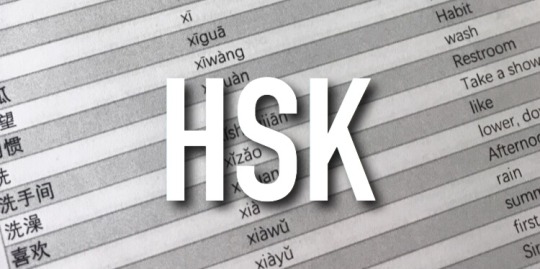
Websites / Videos to help you practice!
Mock tests, previous tests & audio (all levels)
Mock tests & audio (all levels)
Audio & mock tests (Youtube) (all levels)
Speaking, listening & learning (Youtube) (beginner levels)
Listening, speaking, sentence patterns and vocabulary (Youtube) (intermediate and above)
Grammar lessons & listening (Youtube) (Mostly HSK 3 & 4)
Pronunciation, various lessons, listening (Youtube) (Mostly beginner, most levels)
Flashcards & games (all levels)
Vocabulary (all levels)
I hope this helps any beginners who want to learn the Chinese language or people who are studying for HSK!
2K notes
·
View notes
Text
Mandarin tongue twisters
四 是 四 , 十 是 十 , 十 四 是 十 四 , 四 十 是 四 十 (sì shì sì, shí shì shí, shí sì shì shí sì, sì shí shì sì shí)
four is four, ten is ten, fourteen is fourteen, forty is forty
知道就说知道, 不知道就说不知道, 不要知道说不知道, 也不要不知道说知道, 你知道不知道? (zhī dào jiù shuō zhī dào, bù zhī dào jiù shuō bu zhī dào, bù yào zhī dào shuō bu zhī dào, yě bù yào bù zhī dào shuō zhī dào, nǐ zhīdào bù zhīdào?)
If you know say you know, if you don’t know say you don’t know, don’t say you know when you don’t know, and don’t not know and say you know, do you know?
扁担长,板凳宽,扁担要绑在板凳上, 板凳不让扁担绑在板凳上,扁担非要绑在板凳上。(biǎn dàn cháng, bǎn dèng kuān, biǎn dàn bǎng zài le bǎn dèng shàng, bǎn dèng bú ràng biǎn dàn bǎng zài bǎn dèng shàng, biǎn dàn fēi yào bǎng zài bǎn dèng shàng.)
A bamboo pole is long, and a bench is wide. The bamboo pole was bound to the bench. The bench did not allow the pole to be bound to it, but the pole insisted on being bound to the bench.
青青山上一根藤,青藤底下挂铜铃,风吹藤动铜铃动,风停藤停铜铃停。(Qīng qīng shān shàng yī gēn téng, qīng téng dĭ xià guà tóng líng, Fēng chuī téng dòng tóng líng dòng, fēng tíng téng tíng tóng líng tíng.)
On a green mountain grows a vine. Under the vine there hangs a copper bell. When the wind blows, the vine moves, and so does the bell. When the wind stops, the vine stops, and the bell stops too.
鸟岛是岛,鸟岛有鸟。鸟岛的鸟多得数不清了。要想到鸟岛,一定要爱鸟。你不爱小鸟 就别到鸟岛。(niáo dǎo shì dǎo, niáo dǎo yóu niǎo. niáo dǎo de niǎo duō de shǔ bù qīng le. yào xiǎng dào niáo dǎo, yī dìng yào ài niǎo. nǐ bú ài xiáo niǎo jiù bié dào niáo dǎo.)
Bird Island is an island; Bird Island has birds. The birds on Bird Island are countless. If you wish to go to Bird Island, you must love birds. If you don’t love small birds, don’t go to Bird Island.
西施死時四十四。 (Xī Shī sǐ shí sì shí sì.)
Xi Shi died at 44.
2K notes
·
View notes
Photo

1 Month 1 Language
1 Month Kanji Challenge
6 Words A Day
14 Day Langblr Challenge
30 Day Langblr Challenge
34 Hour Langblr Challenge
55 Days of Vocabulary Challenge
90 Day Vocab Challenge
100 Days Challenge For Langblrs
100 Hour 40 Day Language Challenge
Advanced Language Study
A Question A Day Challenge
BaBaDum Challenge
Build Your Vocab Challenge
Composition Challenge
Fiction Writing Challenge
Langblr 25 Challenge
Langblr Accent Tag
Langblr Culture Challenge
Learn A Language Challenge
Original Langblr Content Challenge
Review Challenge
Subtitles Challenge
Summer Language Challenge
Translating Challenge
Writing Challenge
Challenges for certain months:
February Polyglot Challenge
March Polyglot Challenge
April Polyglot Challenge
May Polyglot Challenge
May Polyglot Challenge
August Polyglot Challenge
September Polyglot Challenge
September: 30 Day Langblr Resource Photo Challenge
October Polyglot Challenge
November Polyglot Challenge
December Polyglot Challenge
December Polyglot Challenge
10 Polyglot Things to Do This September
10 Polyglot Things to Do This October
Langblr NaNoWriMo
9K notes
·
View notes
Text
A Stash of Tiny Study Tips
STAYING MOTIVATED
Create realistic goals: get ___ grade on next ____
Manageable let down; get back on track
Keep track of grades: focused, know where stand, no surprises
Start small
Low risk confidence builders
Take time to relax/give self rewards
Days off, breaks, rewards
All work & no play =/= living
Little organization goes a long way
Reward achievements!
Keep balance with exercise, clubs, friends
2h/d: friends and exercise
Remember that hard work pays off
Isn’t a breeze to try to get a 4.0 GPA; but it’s possible
You’re smart enough and can achieve it
90% there with these tips, 10% is just pure hard work
Only chill on weekends
Monday-Friday: school mode
Have time for some fun
If work as hard as should during week, will need weekends to blow off steam
Be self-motivated
Grades can matter, not everything, but follow through on what needs to be done
Not most important part of college but underperform? You will regret it
GPA cutoffs exist and matter to employers
College is full of distractions and opportunities
Nobody will hold hand and the work will suck but all the prouder of yourself to be
Suck it up, buckle down, get it done
If think need break, probably don’t
Turn off the little voice
Realize not alone in questioning ability
Avoid people who tend to burst bubbles no matter what
Physical triggers to stop
Incentive to get something done when know have something else during the day
Don’t have a gaping abyss of study time
Work has to get done, in the end
Books, examiners, and especially your future self isn’t going to care about your excuses for not doing the work
Take the first step
It will almost be fictional how hard you thought the task was going to be
Just keep going because you simply can’t afford NOT to do anything today, nonzero days
Leeway, don’t give your perfectionism control over your life
MUNDANE HABITS
Sleep! Think and function, mind & body
CAN sleep if keep up with coursework instead of procrastinating
Will miss out on some fun stuff
Need to stay awake in class
Figure out what need for full speed
Stay relaxed
Stay physically healthy
Diet and exercise
1 hour exercise during week
Weekends off
Traditional breakfast not necessary if value extra sleep
Systematic habits: neat, prepared
Master material
Look for real world applications
Learning is a process: be patient, don’t expect to master off the bat
Designate study area and study times
Do trial runs
Practice tests
Ask a TA to listen to your oral performance
Study groups
Don’t copy other people’s psets and solutions
BEFORE SEMESTER
Spiral bound notebook, can color code with folders/etc if need be
Lecture notes: front to back
Reading notes: back to front (if fall behind on)
Seminar notes: mixed in with lecture notes, different pen color/labeled
Outline format
Bullet points for everything
Same NB for one set of class notes, separate notebooks for all classes
5-subject notebook
Midterm and exam material in it
Mesh sources, study guide
All study material from week/month in one place
Pick the right major
Indulge in favorite hobby feeling
Pick professors & classes wisely
Take a small class
Pick classes that interest you so studying doesn’t feel torturous
Want to learn
GRADES SPECIFIC
Prioritize class by how can affect GPA
More credits: more weight
Work enough to get an A in your easy classes: take something good at
Don’t settle, don’t slack off, don’t put in minimal effort to get that B/C. Just put in a tiny bit more effort to ensure A
Will have harder classes and need to counteract
Take electives can ace
Anything but an A in an elective is kinda mean and an unnecessary hit for your GPA
FIRST DAY/WEEK/HALF OF CLASSES
Get to know teaching style: focus most on, lecture/notes
Pick and follow a specific note taking format
Outline
Date each entry
Capture everything on board
Decide productivity system
Google Cal
Todoist
Agenda: remind meetings, class schedule, important dates/midterms/quizzes/tests, no homework
Always wanted to be prepared
Rarely last minute
Have plan, stay focused
Homework notebook
Good redundancy
Study syllabus
Know it thoroughly
Plot all due dates after class
Penalize if fail to abide by
Study the hardest for the first exam
Seems counterintuitive
Hardest/most important test
Pay attention to content and formatLess pressure: just need ___ on final to keep my A
Easy to start high and keep high
Go into crunch mode at the beginning
End softly
Get plenty of sleep, exercise, and good food in the finals days before the exam
DURING SEMESTER: PEOPLE
Get to know professors: go to office hours, care about grades/course/them
Easier ask for help, rec letter
Get to know interests and what they think is important
Figure out their research interests, 60% of their job is research
Learning is dynamic
Discussion helps
Get feedback early when not sure what doing
Take comments constructively
Consistent class participation: ask questions, give answers, comment when appropriate
Understand material
Find a study buddy in each class: don’t have to study with
Somebody can compare notes with, safety net
Pick somebody who attends, participates, and take notes regularly
Make some friends
Participate as fully as can in group activities
Be involved
Learn – not be taught
Be punctual
Good impression, on human professors
DON’T BE LATE
Skipping class =/= option: It’s “cool” to get attendance award
Make all the classes: it’s hard to feel confident when missing key pieces
Get full scope of class, everything will make a lot more sense and save a lot of time in long run
Mandatory class: higher graduating cumulative GPA
Go to class when no one else does/want to show up, reward
Get to know professor, what’s on test, notice, r/s build, material not in reading
Unless optional and super confusing professor
Sit in one of the first rows
Don’t fall asleep
Fake interest if you have to
Tutors
DURING SEMESTER: THINGS TO DO
Take notes! Provided is bare minimum, accessed by students who aren’t attending lecture
Based on lecture and what read –> test; it’ll be worth it
Write it down
By hand
Bored? Doodle instead of going online
Read all assigned–even if need to skim
Seems cumbersome and maybe impossible
Figure out what’s important
Look at the logical progression of the argument/what’s important/what trying to prove
Understand everything that you do read–even if don’t read everything
PIck 2 examples from text per topic
Complete course material on time
DO NOT WAIT UNTIL DAY BEFORE IT IS DUE
Begin as soon as possible
Sometimes it’s just straight up impossible
Have it look attractive
Library doesn’t just mean = study
Social media in the library is still social media
Confusion is terrible
Read other textbooks, review course material @ another uni/by another professor, google the shit out of it
Review
Do not wait, do throughout semester
Exam prep
Ask for model papers, look at style & structure, thesis, how cite
Get old tests
Look at type of questions (detail level and structure)
Can solve old exams cold
If give out paper exams in class: probs won’t repeat questions, focus more on concepts but still learn the questions
Have class notes and psets down cold
Do all the practice problems
Read through notes a few times; rewrite into a revision notebook
Highlight major topics and subtopics
Different highlighter for vocab terms
Overall picture, go from concept to detail
Look at overall context and how specific idea fit into whole course
Ideas, don’t memorize all your notes
Better understand = more able to use and manipulate info and remember it. Understand = manipulation.
Charts, diagrams, graphs
Lists
Practice drawing labeled structures
Flash cards for memorization
Every school requires some degree of grunt memorization
Say it aloud, write it down
Get friends to quiz you
Self-test: severely challenge self, have a running collection of exam questions
Explain difficult concepts to your friends; force yourself to articulate the concept
Never pull an all-nighter
Do not spend every hour studying up to the exam
Eat, shower, sleep
Don’t wait until night before exam to study
Prep takes time even if reviewed throughout semester
Ask about format–don’t ask the professor to change it for you
Law of College: it will be on the exam if you don’t understand it
Ask professor, internet, textbooks
Night before exam
Jot what want to remember/have fresh
Read through in morning/before exam
Physical prep
Sleep, have test materials
Day of exam
Don’t cram every single spare minute
Go to bathroom before exam
Never miss an exam/lie to get more time
You won’t be any more ready 2-3 days after when supposed to have taken it
Slay exam. Get A.
WEEKLY
Friday morning: go through each syllabus, write down in HW notebook
All hw during weekend; study/reading assignments during week
Save everything
Divide big tasks into small pieces to help propel self
Standard study schedule: block off lectures, labs, regular commitments
Note the weeks that have assignments and tests that will require extra studying
Don’t oscillate too heavily every day with study times (i.e. don’t study 2-3 hours for weeks and then 10-12 hour days right before an exam)
Eat and sleep to make more extended work periods liveable and enjoyable
DAILY
Set an amount of time would like to study every day
Try to study most days
Avoid vague/zoned out studying –> waste of time
Do a little bit daily but don’t let studying be your whole day
Review notes: 30mins/day, each class from that day
Look at important ideas/vocab
Prioritize new vocab because language is most fundamental and important tool in any subject
Circle abbreviations and make yourself a key somewhere so you don’t forget what the hell that abbreviations meant
Check spelling
Rewrite/reorganize notes if necessary
Format of ideas is just as important as the concepts themselves, esp. when it comes time for exam review
This helps you retain the material so you’ll be ahead next time you walk into class
Chance to ID any knowledge gaps that you can ask about for next class
Keep up with reading
Skim text before lecture or at least main topic sentences
Jot down anything don’t understand; if lecture doesn’t clarify, ask the professor
After lecture: skim again, outline chapter, make vocab flashcards
Highlight similar class and lecture notes
will definitely be tested on
Review and make study questions
Study
Disconnect from anything irrelevant to study material: help focus and your GPA
Don’t limit studying to the night
Study whenever, wherever between classes
Variety helps focus and motivation
Especially if tired at night and can’t transition between subjects
Try to study for a specific subject right before/after the class
28K notes
·
View notes
Photo

1. Mindmaps - Terms are placed in bubbles on a piece of paper with arrows drawn between them to show how terms are connected.
Good at helping you see relationships between ideas.
Cause you to define a term, then see how it relates to a broader picture.
Can help you see cause and effect, dissimilarities and similarities, and how different ideas interact.
Maybe not good for learning what terms mean.
Particularly useful for essay exams, policy, history, social sciences, and literature.
2. Venn Diagrams - Two circles overlap, with the overlapping section being for writing similarities and the other two sections being for writing contrasts.
Good at helping you differentiate between ideas.
Maybe not good for comparing more than three ideas at the same time.
Particularly useful for essay exams or if you are confused about two similar terms.
3. Time Lines - A line is drawn and labeled with a unit of time (year, point in the book, etc), and events are added above the time they occurred.
Good at helping you place events in relative order.
Maybe not good if you need to define events as well (there may not be enough space to do so).
Particularly useful for exams that require you to memorize relative order, history, and literature.
4. Flashcards - A card has a term on one side and a definition on the other.
Good at helping you memorize short bytes of information.
Maybe not good for learning complex concepts or connecting concepts.
Particularly useful for learning vocabulary, foreign languages, and English.
5. Vocab lists - A piece of paper has terms written in one column. Next to the terms are their respective definitions in another column. The paper is then folded and used as a memory tool.
Similar to flashcards, but it is easier to see the differences between terms.
Disadvantaged in that the order you see the terms is not random.
6. Step-by-Step How-To Guides - Write how to do a problem step by step. Optionally, include an example to the side that shows each step.
Good at helping you learn how to do methodical problems.
Maybe not good for learning the reason why you do the steps you do.
Particularly useful for math and science.
7. Rewriting Notes - This is not simply making it prettier but reworking the wording so that it is in your own voice.
Good at helping you review concepts thoroughly.
Maybe not good if you are on a time crunch or find yourself not thinking through each word you’re writing.
Particularly useful for classes with a lot of details.
8. Summarizing Notes - Going through your notes and condensing the ideas.
Good at helping you see the main idea/big picture/key facts.
Maybe not good if you want to see the relationships between ideas or if the ideas are very complex.
Particularly useful for cramming.
9. Teaching Someone Else - Tutor someone else, give a presentation to your friends or family, or simply voice your thoughts out loud to a pet or stuffed animal.
Good at helping you understand concepts.
Maybe not good if you don’t know anything at all.
Particularly useful for all classes!
10. Rereading - Rereading notes and diagrams.
Good at helping you review very quickly.
Maybe not good for memorizing or learning concepts.
Particularly useful for skimming right before a test.
4K notes
·
View notes



